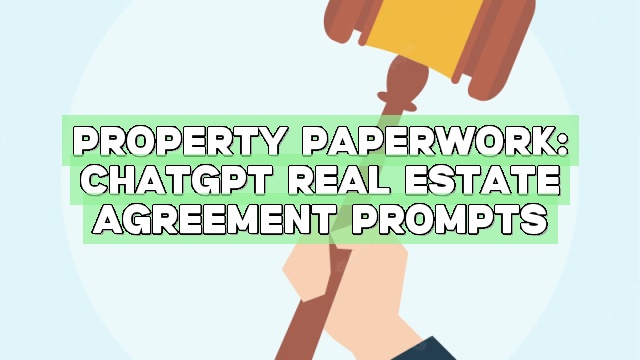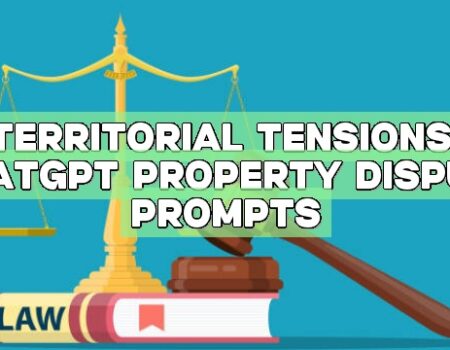When it comes to real estate transactions, it’s essential to have accurate and legally binding agreements in place to protect all parties involved. However, drafting these agreements can often be a time-consuming and challenging task, which is why more and more people are turning to the power of artificial intelligence to streamline the process. In this article, we’ll be exploring how ChatGPT prompts can simplify and expedite the creation of real estate agreements.
Key Takeaways:
- The use of ChatGPT prompts for real estate agreements can save time and effort.
- AI support enables seamless property deals and faster turnaround times.
- ChatGPT can assist in generating both simple and complex agreement prompts.
- Legal compliance and data security are critical aspects of AI-generated agreements.
- The integration of ChatGPT in the real estate industry is on the rise.
Understanding Real Estate Agreements
Real estate agreements are legal documents that define the terms of a property transaction between a buyer and a seller. They play a crucial role in protecting the interests of both parties and ensuring a smooth transfer of ownership.
A typical real estate agreement includes several key components, such as a description of the property, the purchase price, the payment method, and any conditions or contingencies of the sale. It also outlines the rights and responsibilities of each party, such as the seller’s obligation to disclose any defects in the property and the buyer’s right to conduct inspections.
Real estate agreements are binding contracts that carry legal and financial implications. It is essential to ensure that they are drafted accurately and thoroughly to avoid any misunderstandings or disputes between the parties involved.
Introducing ChatGPT for Real Estate Agreements
As the real estate industry gets increasingly digitized, there is a growing demand for streamlined paperwork processes to facilitate quick and efficient transactions. ChatGPT, an AI tool, is one solution to this need.
ChatGPT’s natural language processing capabilities make it an ideal candidate for generating prompts and responses for real estate agreements. It can understand the language and context of the agreement required and provide suitable prompts that can expedite the process.
Furthermore, ChatGPT is more than just a word generator. It can also analyze and provide suggestions based on the legal and technical requirements of the agreement. This AI can learn and adapt to a user’s unique style and preferences, providing tailored prompts and responses that reflect the user’s specific requirements.
Overall, ChatGPT has the potential to revolutionize the real estate industry by accelerating the paperwork process and creating more efficient transactions. Its language understanding and context awareness make it an invaluable tool for generating real estate agreement prompts.
Using ChatGPT for Simple Agreement Prompts
One of the significant advantages of using ChatGPT for real estate agreements is the speed at which simple agreement prompts can be generated. For instance, questions such as “Do both parties agree to the sale price?” or “What is the move-in date?” can be answered with ease, thanks to the language understanding capabilities of the AI tool.
ChatGPT can also be utilized to generate multiple choice questions, which can streamline the agreement drafting process even further. For instance, ChatGPT can provide options such as “Yes,” “No,” or “Undecided” for questions like, “Is the property being sold as is?” at lightning-fast speeds.
Moreover, simple prompts like these can be modified and customized to fit specific real estate agreements and legal regulations. In addition, by reducing the time required to draft agreements, ChatGPT can help to accelerate property transactions and ensure timely completion of deals.
Leveraging ChatGPT for Complex Agreement Prompts
While ChatGPT offers excellent support for simple agreements, it is equally powerful when generating prompts for complex real estate deals.
When drafting a complex agreement, it is essential to break down the task into multiple prompts and provide relevant background information for ChatGPT to understand the context and generate accurate responses.
For example, if a real estate transaction involves multiple properties, ChatGPT can generate prompts that consider each property’s unique characteristics and any potential legal or environmental issues. Similarly, if the agreement involves financing from multiple sources, ChatGPT can provide different prompts based on each lender’s requirements.
To maximize the benefits of ChatGPT for complex agreements, it is essential to provide clear and concise instructions and ensure the AI has access to all necessary information. Stakeholders should work together to define the key terms and contingencies before generating prompts with ChatGPT.
By leveraging ChatGPT prompts for complex real estate agreements, stakeholders can streamline the drafting process and ensure all parties are on the same page.
Ensuring Legal Compliance with ChatGPT
Legal compliance is crucial in any real estate agreement. Some may be concerned about the accuracy and legality of using AI-generated prompts in these agreements. However, with proper review and verification, ChatGPT can be a valuable tool for ensuring legal compliance.
One way to ensure compliance is by having legal experts review and verify the AI-generated prompts. These experts can identify potential legal issues and provide guidance on how to address them.
Another approach is to use ChatGPT in conjunction with pre-approved templates and standardized clauses. This can help ensure that the generated prompts align with legal requirements and industry standards.
It is also important to note that the responsibility for legal compliance ultimately lies with the parties involved in the agreement. Therefore, it is crucial to carefully review and verify all content, whether generated by humans or AI.
Overall, ChatGPT can be a useful tool for generating prompts for real estate agreements while also ensuring legal compliance. By incorporating legal review and verification processes, parties can confidently use ChatGPT to expedite the agreement drafting process without compromising accuracy or legality.
Enhancing Efficiency with ChatGPT Collaboration
Real estate transactions involve multiple parties, such as buyers, sellers, and agents. Collaborating efficiently and effectively is essential for smooth and timely completion of real estate agreements. With ChatGPT, stakeholders can collaborate seamlessly in real-time, thereby reducing communication gaps and improving the overall efficiency of the process.
Real-Time Communication
ChatGPT enables parties to engage in real-time communication, eliminating the need for long email chains and delayed responses. Users can interact with the AI tool, assign tasks, and receive reminders about pending actions. This feature enhances productivity and saves time by streamlining communication and eliminating the need for back-and-forth emails.
Document Sharing
ChatGPT facilitates document sharing, allowing parties to access and work on the same document simultaneously. This feature ensures that all parties are on the same page and can collaborate efficiently. Any changes made to the document are automatically saved in real-time, eliminating version control issues and reducing the risk of errors.
Feedback Integration
With ChatGPT feedback integration, parties can easily review and provide feedback on the document in real-time. This feature enhances collaboration by allowing parties to provide input and make changes collaboratively. Feedback can be provided directly on the document, and parties can track the changes made by each other, ensuring that everyone is on the same page.
By streamlining communication, facilitating document sharing, and integrating feedback, ChatGPT collaboration enhances efficiency and productivity in real estate agreements. The tool ensures that parties can work together seamlessly towards a common goal, resulting in timely completion of transactions.
Overcoming Limitations and Challenges
While ChatGPT can be a powerful tool for generating prompts for real estate agreements, there are some potential limitations and challenges that users may encounter. Being aware of these issues can help users mitigate risks and make the most of this AI tool.
Limitations
One limitation of ChatGPT is that it may not be able to accommodate all types of real estate agreements. For instance, the AI may struggle with agreements that involve intricate or highly technical language. In such cases, it may be necessary to seek additional legal support or use alternative drafting methods.
Another limitation of ChatGPT is that it may not capture all the nuances of a specific transaction. Subtle details or unique circumstances may require additional attention and manual intervention to ensure the agreement is accurate and legally binding.
Challenges
One of the main challenges of using ChatGPT is ensuring that the prompts produced are legally compliant. It is essential to review and verify the generated content for accuracy and legality, as well as ensure that the completed agreement reflects the intentions of all parties involved.
Another challenge is ensuring that all stakeholders involved in the agreement are comfortable with using AI technology. Some individuals may be resistant to the adoption of AI tools for property transactions, citing concerns about potential errors or inaccuracies.
Finally, there may be issues surrounding data privacy and security. Sensitive information may need to be protected to prevent unauthorized access or disclosure.
Despite these limitations and challenges, ChatGPT can still be a valuable tool for streamlining the agreement drafting process. Users should be aware of the potential risks and take steps to mitigate them, such as seeking legal support or reviewing the generated content carefully.
Ensuring Data Security and Privacy
Data security and privacy are critical concerns when dealing with real estate agreements. While AI-powered tools like ChatGPT can streamline the process, it is essential to ensure that sensitive information is protected.
One important measure is to limit access to the AI-generated prompts. Only authorized individuals should have access to the information to prevent data breaches and unauthorized use.
Another important consideration is the use of encryption for data transmission. All data should be encrypted to prevent interception and misuse. Additionally, the use of multi-factor authentication can add an extra layer of security to the process.
It is also important to ensure that the AI-generated prompts are accurate and comply with legal regulations. Thoroughly reviewing and verifying the content is critical to ensure that the prompts are legally binding and accurate.
Finally, it is essential to have a clear data management policy in place that outlines how data will be collected, stored, and used. The policy should adhere to all relevant data protection regulations and ensure that data is only used for the intended purpose.
ChatGPT Integration and Adoption in the Real Estate Industry
The integration of ChatGPT in the real estate industry has gained momentum in recent years. This is due to the benefits it offers, such as streamlining of property paperwork, reduction in human error, improved efficiency, and cost savings. As more people become aware of the capabilities of AI-powered prompts, the industry is expected to see a rise in their adoption.
ChatGPT integration can occur at various stages of the real estate transaction process. From generating simple agreement prompts to drafting complex contracts, the AI tool helps simplify and expedite the process. ChatGPT can also facilitate collaboration among stakeholders by providing real-time communication, document sharing, and feedback integration.
The real estate industry has already seen success stories with ChatGPT integration. One notable example is property management companies leveraging the tool to streamline rental agreements. By using ChatGPT’s capabilities, they have been able to reduce the time it takes to draft agreements and improve the accuracy of the content.
As the technology advances and its use becomes more widespread, ChatGPT is expected to enhance the real estate industry’s efficiency and cost-effectiveness. This will benefit not just businesses but also individual buyers and sellers, who can also use the tool to expedite the paperwork process and reduce the associated costs.
Conclusion
ChatGPT is revolutionizing the way we approach real estate agreements. By leveraging AI-powered prompts, property transactions are streamlined, efficient, and legally compliant. From generating simple prompts to handling more complex agreements, ChatGPT assists real estate professionals in expediting the drafting process.
The value of ChatGPT integration extends beyond automated prompts. Real-time collaboration among stakeholders is enhanced, facilitating smooth communication and feedback integration. Potential limitations and challenges can be mitigated with practical solutions and alternative approaches. Furthermore, data security and privacy measures ensure that sensitive information remains protected.
As the real estate industry embraces digital transformation, ChatGPT adoption presents exciting possibilities. The success stories of those who have already adopted the technology are encouraging, and the implications of widespread integration are significant. In conclusion, ChatGPT prompts are a valuable tool for real estate professionals seeking to optimize their workflow and maximize efficiency in property transactions.
FAQ
Q: What is ChatGPT?
A: ChatGPT is an AI tool that uses natural language processing to generate responses based on prompts provided by users.
Q: How can ChatGPT help with real estate agreements?
A: ChatGPT can assist in generating prompts for real estate agreements, streamlining the drafting process and enabling seamless property deals.
Q: What are the benefits of using ChatGPT for real estate agreements?
A: ChatGPT offers language understanding and context awareness, making it a valuable tool for generating accurate and relevant prompts.
Q: Can ChatGPT generate prompts for complex real estate agreements?
A: Yes, ChatGPT can be used for both simple and complex real estate agreements. Longer prompts and background information can guide the AI’s response.
Q: How can I ensure legal compliance when using ChatGPT?
A: It is important to review and verify the AI-generated content for accuracy and legality to ensure compliance with legal requirements.
Q: How can ChatGPT facilitate collaboration in real estate agreements?
A: ChatGPT enables real-time communication, document sharing, and feedback integration, enhancing efficiency and collaboration among stakeholders.
Q: What are the limitations and challenges of using ChatGPT for real estate agreements?
A: Potential limitations include generating responses that may require human verification and addressing specific legal requirements. Solutions and alternative approaches can mitigate these challenges.
Q: How can data security and privacy be ensured when using ChatGPT?
A: It is important to implement measures such as encryption and secure storage to protect sensitive information when using ChatGPT.
Q: How is ChatGPT being integrated and adopted in the real estate industry?
A: ChatGPT is currently being integrated into various real estate processes, and its adoption is expected to increase in the future. Success stories and implications of widespread adoption are being explored.









